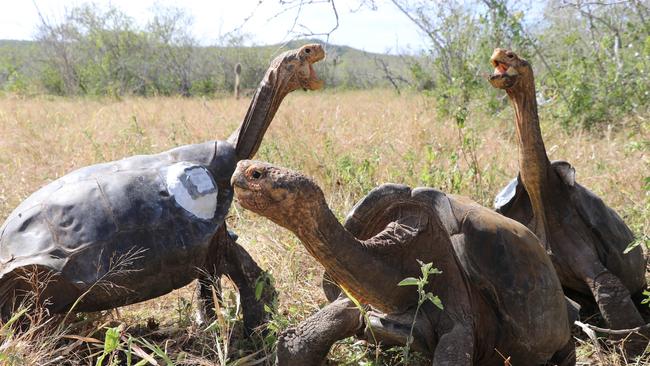Chinese fishing fleet accused of ‘raping’ Galapagos on industrial scale
The Galapagos Islands has accused China of pillaging the area’s vital food supplies on an industrial scale.

The Galapagos Islands, one of the world’s most important marine reserves, has accused China of pillaging the area’s vital food supplies on an industrial scale.
Satellite and radio tracking data has shown that almost 300 vessels, part of China’s massive “distant-water” fishing fleet, which includes refuelling vessels and fish processing plants, were stationed off the islands in July and August.
The ships are understood to have caught several thousands tonnes of squid, tuna and billfish.
The fish are critical to the diet of several protected species in the Galapagos, which belong to Ecuador, and essential to the islands’ economy.
“This is an attack on our resources,” Angel Yanez Vinueza, the mayor of the Santa Cruz province on the islands, told the Los Angeles Times. “They are killing the species we have protected and polluting our biota with the plastic waste they drop overboard. They are raping the Galapagos.”
The presence of the flotilla, just outside the exclusive economic zone that surrounds the islands, led to diplomatic appeals for restraint on the part of China from the Ecuadorean government. Both the Ecuador navy and a US Coast Guard cutter also stepped up patrols of the area to ensure the Chinese vessels at least remained in international waters.
The Chinese embassy in Quito insisted that Beijing respected Ecuador’s measures to protect the environment and preserve marine resources.
Yet even on the shore, there is evidence of unprecedented environmental damage.
Park guides on the Galapagos say the area is strewn with plastic bottles and equipment packaging, seemingly recently discarded and labelled in Chinese, which they suspect come from the ships.
The US Coast Guard said that several of the Chinese vessels appeared to have deliberately concealed their locations, switching their GPS transponders off or, in one case, reporting an alternative location thousands of kilometres away in Alaska.
A US official described the volume of ships as like a “city” at sea. The Galapagos, famed for their many endemic species, were studied by Charles Darwin in the 1830s. His observations there formed a key part of the development of his theory of evolution and natural selection.
The islands’ economy has been badly hit by the coronavirus pandemic, which has led to a drop in tourism.
The marine nature park is normally open to a restricted number of tourists each year, who each pay a $US100 entry fee. Income since March this year has sunk to under 10 per cent of levels before COVID-19.
The Ecuadorean government is lobbying to extend the exclusive economic zone around the islands, so it links up with the areas it also controls off the mainland. This would block off a channel of international waters where the Chinese fleet operates.
The Times


